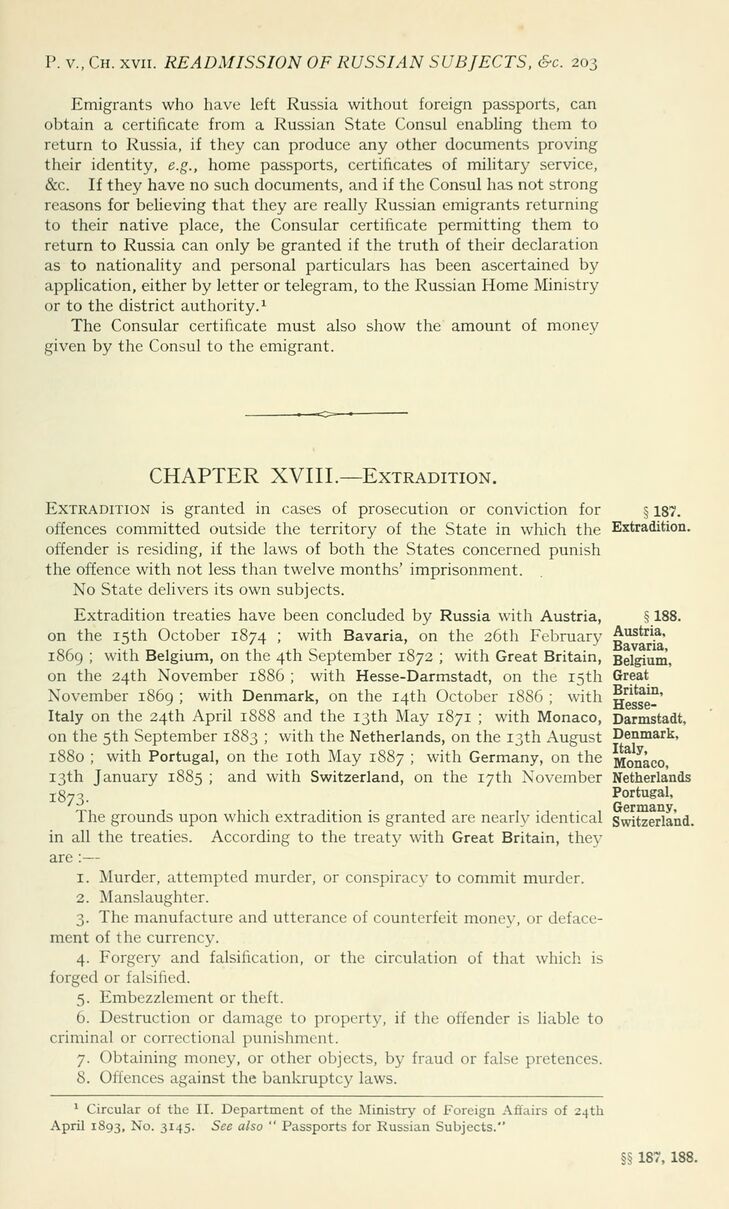
Full resolution (JPEG) - On this page / på denna sida - Pages ...

<< prev. page << föreg. sida << >> nästa sida >> next page >>
Below is the raw OCR text
from the above scanned image.
Do you see an error? Proofread the page now!
Här nedan syns maskintolkade texten från faksimilbilden ovan.
Ser du något fel? Korrekturläs sidan nu!
This page has never been proofread. / Denna sida har aldrig korrekturlästs.
P. v., Сн. xvii. RE ADMISSION OF RUSSIAN SUB JECTS, &c. 203
Emigrants who have left Russia without foreign passports, can
obtain a certificate from a Russian State Consul enabling them to
return to Russia, if they can produce any other documents proving
their identity, e.g., home passports, certificates of military service,
&c. If they have no such documents, and if the Consul has not strong
reasons for believing that they are really Russian emigrants returning
to their native place, the Consular certificate permitting them to
return to Russia can only be granted if the truth of their declaration
as to nationality and personal particulars has been ascertained by
application, either by letter or telegram, to the Russian Home Ministry
or to the district authority.1
The Consular certificate must also show the amount of money
given by the Consul to the emigrant.
CHAPTER XVIII.—Extradition.
Extradition is granted in cases of prosecution or conviction for
offences committed outside the territory of the State in which the
offender is residing, if the laws of both the States concerned punish
the offence with not less than twelve months’ imprisonment.
No State delivers its own subjects.
Extradition treaties have been concluded by Russia with Austria,
on the 15th October 1874 ; with Bavaria, on the 26th February
1869 ; with Belgium, on the 4th September 1872 ; with Great Britain,
on the 24th November 1886 ; with Hesse-Darmstadt, on the 15th
November 1869 ; with Denmark, on the 14th October 1886 ; with
Italy on the 24th April 1888 and the 13th May 1871 ; with Monaco,
on the 5th September 1883 ; with the Netherlands, on the 13th August
1880 ; with Portugal, on the 10th May 1887 ; with Germany, on the
13th January 1885 ; and with Switzerland, on the 17th November
1873.
The grounds upon which extradition is granted are nearly identical
in all the treaties. According to the treaty with Great Britain, they
are :—
1. Murder, attempted murder, or conspiracy to commit murder.
2. Manslaughter.
3. The manufacture and utterance of counterfeit money, or
defacement of the currency.
4. Forgery and falsification, or the circulation of that which is
forged or falsified.
5. Embezzlement or theft.
6. Destruction or damage to property, if the offender is liable to
criminal or correctional punishment.
7. Obtaining money, or other objects, by fraud or false pretences.
8. Offences against the bankruptcy laws.
1 Circular of the II. Department of the Ministry of Foreign Affairs of 24th
April 1893, No. 3145. See also " Passports for Russian Subjects."
§187.
Extradition.
§188.
Austria,
Bavaria,
Belgium,
Great
Britain, [-Hesse-Darmstadt,-]
{+Hesse-
Darmstadt,+}
Denmark,
Italy,
Monaco,
Netherlands
Portugal,
Germany,
Switzerland.
§§ 182, 183.
<< prev. page << föreg. sida << >> nästa sida >> next page >>